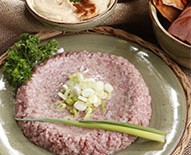Meet me at Jafra: Peace in Lebanon
Cooking food together at JafraBy Sarah Kaddoura, Lebanon
We Are Not Numbers/ Contributing writer
A group of friends recently organized a small gathering, which ended up including more than 40 people—both acquaintances and strangers—within the confines of a newly established café and meeting place in Beirut called Jafra (named after a well-known Palestinian folk tale). This small meeting place, situated somewhere between the narrow alleys of the Burj Al-Barajneh refugee camp, was opened last year to bring Palestinians together with people of other nationalities and religions. Lebanon is a fractious country, with politics too often pitting Palestinians against Lebanese against Syrians.
Jafra also is the first mixed gathering place for both girls and boys. While there aren’t any formal gender-segregation policies, the Palestinian camps have a conservative culture, which usually means such places are dominated by men.
Visitors to Jafra enjoy their cup of coffee surrounded by pictures of Palestinian icons and beautifully written poetic verses. They also can read or hold meetings in its small library, to which everyone donates books, while being watched by a huge portrait of Ghassan Kanafani, one of the most famous novelists of recent Palestinian history.
The gathering was organized by a group of friends, both Palestinian and Lebanese, who wanted to introduce others to Jafra and the possibility of cooperation between those living both in and out of the camps, through dialogue, arts and other activities. I was pleased to see many Lebanese activists with whom I had protested during the last demonstrations in Lebanon, screaming against sectarianism, racism, sexism, homophobia and classism. Those two months of demonstrations showed me and many of my Palestinian friends how easy it is to side with the Lebanese against all forms of oppression, even if we are not allowed to be citizens here. There, in Jafra—as we discussed issues that mattered to us and shared mughrabieh, a type of Palestinian couscous, and listened to one of the owners play oud (a musical instrument similar to a guitar)—a sense of solidarity and oneness was tangible. Despite the constant attempts by politicians to stir racism and feelings of supremacy, we held hands to dance the dabkeh with this in mind: In the face of injustice and oppression, we stand united. Borders we did not draw do not define what we can and cannot believe. When I protest against the illegitimate Lebanese government with my Lebanese friends, I know they will support me by protesting the unjust discrimination by this same government against Palestinian refugees.
The sun was going down, and before I left to catch a bus home, one of the attendees caught me with her video camera. I watched her ask various people the most random questions. She brought the lens close to my face as if she wanted to strip me of my body language and just focus on my jaw as I answer. She asked me about the camp and what it meant to me. I paused for a while. I’ve never lived in a camp, even though my parents grew up in several. I felt detached from many of the struggles of Palestinians who live within its confines. With that in mind, I told her I cannot romanticize the idea of the camp. Like other camps around Lebanon, Burj-al-Barajneh is overcrowded, the water isn’t potable, electricity is even scarcer than in the rest of Lebanon, and the roads and alleys are in disrepair. However, when I go to any camp, anywhere in Lebanon, it feels like home. Home is not a place we would necessarily choose. But you know it’s home when you share something important with the others who live there. You share a sense of responsibility. You share history and a heritage that refuses to die. You share aspirations and a desire to grow beyond the limitations its borders set for us.
Before I left, the girl with the camera asked if I believe that one day Pink Floyd would come to perform in the Burj al-Barajneh camp. I laughed.
“Why not?” I asked. Roger Waters is a huge advocate of the Palestinian cause. So maybe one day he’ll bring the band back together and sing in the camp. Why not?








